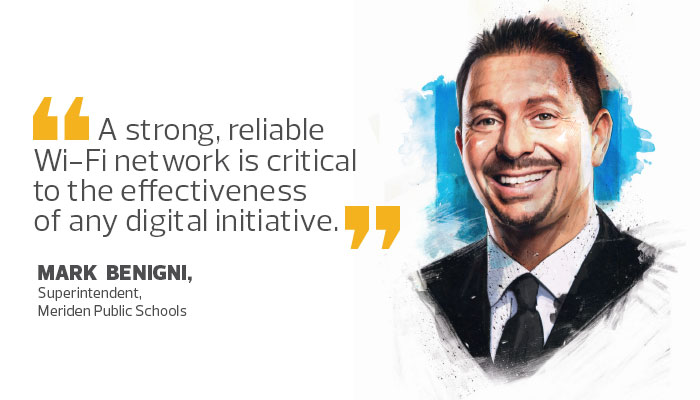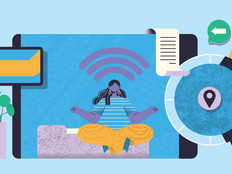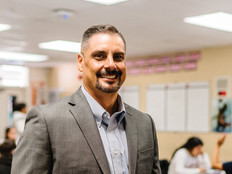Q&A: Meriden Public Schools’ Mark Benigni Says Wi-Fi Access Crucial to Digital Equity
Thanks to the collaboration of many stakeholders and a combination of bring-your-own-device and one-to-one computing, all of the students in Meriden Public Schools have a device each school day. We talked to superintendent Mark Benigni about how this digital equity program works in their schools.
EDTECH: What does “digital equity” mean to you?
BENIGNI: At Meriden Public Schools, we’ve long believed that, regardless of socioeconomic status or prior learning experiences, all students must be able to access digital resources to expand their world. We strive to put the necessary resources, both hardware and connectivity, in place to ensure our students have the digital world at their fingertips.
EDTECH: What are the biggest challenges to achieving digital equity, and how do you meet them?
BENIGNI: With Meriden’s K–12 bring-your-own-device program, we found all students did not have access to devices at school or at home. So we shifted to a one-to-one environment at our two high schools and two middle schools, as well as all fourth- and fifth-grade classrooms. This has required strategic budgeting and a reallocation of resources. To support the additional devices in our district, we also had to expand our network infrastructure and partner with the community to identify free Wi-Fi zones throughout the city.

EDTECH: What is the most vital piece of technology for enabling this?
BENIGNI: A strong, reliable Wi-Fi network is critical to the effectiveness of any digital initiative. There is no equity without access. Without it, devices no longer extend the learning environment and students are unable to access the rich digital resources available. A comprehensive plan must also include engaging digital content, appropriate devices and ongoing staff professional development.
EDTECH: How important is teacher training?
BENIGNI: Teacher training is essential. We know when our teachers learn, our students learn. If teachers don’t have the proper support, technology tools sit unused or do not add to the student learning experience. Because teachers have varying comfort levels with technology, we provide professional learning opportunities at all levels.
EDTECH: What role do parents play in achieving digital equity, and how do you get them on board?
BENIGNI: At Meriden Public Schools, parents become active participants in the use of technology when they monitor student progress through the use of digital tools such as the Student Information System Parent Portal, as well as applications like Remind, Class Dojo, School Messenger and Twitter.
School-based events, such as the Technology Community Forum, parent learning walks, open houses and multicultural nights, invite parents into the schools where students demonstrate the meaningful use of technology.
EDTECH: How do you know your efforts are working? How do you measure success?
BENIGNI: We look to both academic and social-emotional indicators to measure success. This includes analyzing growth in both standardized test scores and internal formative assessments. More students are reporting that teachers care about them. Across grade levels, Meriden Public Schools continues to see a measurable decrease in discipline referrals and suspensions. We have also seen a substantial increase in student attendance, demonstrating that Meriden is fostering schools where teachers and students want to be.
EDTECH: What advice do you have for other educators?
BENIGNI: Look closely at how you organize staff and allocate resources as your current organizational structure may not support a digital transformation. In Meriden, this meant promoting the director of instructional technology to assistant superintendent, combining the positions of director of curriculum and director of instructional technology, and creating the position of supervisor of blended learning.
EDTECH: What's the coolest or most exciting thing your district is doing to achieve digital equity?
BENIGNI: It’s when students leverage the power of technology to become the teacher and facilitate learning. In the elementary schools, Tech Buddies are not only partnering with younger grades, but are also going into classrooms to support teachers. Students are taking the lead during teacher professional development and highlighting technology tools and the possibilities they hold. High school students have developed a partnership with the local senior citizen center and are teaching technology skills while building relationships with community stakeholders.
Students at all levels participate in board of education meetings, showcasing technology skills and educational impact. If we don’t place limits on students and provide them with the tools they need, the possibilities are endless.
Part of the Rise to the Challenge series of interviews with top experts in K–12 education.








